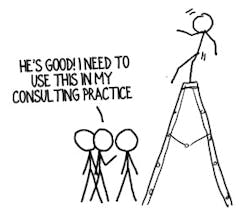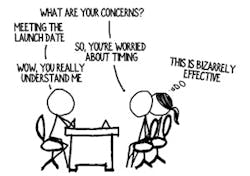A number of years ago in Pittsburgh, a small group of onlookers (including me) collectively gasped. The slender, young man we were watching wobbled at the top of his ladder, briefly looking like he was going to fall. Then he deftly kicked out the ladder’s integrated platform and continued his home-show demonstration of the Little Giant ladder. Ten minutes later, every single one of us paid an impressive sum to own the Rolls Royce of ladders. That man could close! And so can you.
The prerequisite for this question is that at least four of the Six Pillars of Selling Success are in place with your prospect: Know, Like, Need and Want. Ideally, the two remaining Pillars—Trust and Value—should be firmly established too, but you’re allowed a little wiggle room because this question is going to cement those for you. Note that you don’t need to climb on top of the pillars; unless you’re actually in the business of selling ladders.
I see too many salespeople trying to bull their way through the selling process by extolling the virtues of their “unique” product which, of course, reduces their customers’ costs, increases revenue, compels all employees to chant Kumbaya, and cleans the dishes without leaving water spots. They supplement the product pitch by grandly presenting their vision, values and pedigree, and rattling off testimonials of satisfied customers who have received extraordinary value (not to mention sparkling glassware).
There’s nothing wrong with pointing out the benefits of your offering, but that shouldn’t be the centerpiece of your dialogue. Pitching works at home shows, but not when you’re selling anything complex. Take some time to inquire. What’s changed for them? Why do they need your offering? What does success look like? Why are they bothering to address the issue you’re discussing?
Which brings us to the one question that will turn you into a closing monster: “What concerns do you have about purchasing ?” That’s it. That’s the magic question. Simply ask your prospect that question and probe to get all their concerns.Asking for your prospect’s concerns will improve your ability to win business for three reasons:
1. It surfaces all the objections early in the process. Most salespeople are blindsided when the prospect responds to their pitch with something like, “I don’t think my engineering department will go along with this” or the oh-so-common, “The price is too high.” The salesperson is back on his heels, defending his proposal or taking down prices.
But you’ll have already talked with the engineering department, constructed the right combination of offerings to meet your prospect’s budget and anticipated other push-back, because you knew about those concerns before you submitted the proposal. You’re on the offensive, not defending.
3. It builds value. You can tweak your offering to obviate the client’s concerns, which reduces the risk and boosts the benefits. For instance, if the concern is the engineering department won’t be effective with your product, you could build a training program into your proposal. If the prospect worries that there won’t be an ROI, you can start with a pilot, with clear action standards and a roll-out plan. When the customer sees that your offering seamlessly addresses all their concerns, they feel like you are tailor made to help their company and that you will provide far more value than other vendors.
Many salespeople are afraid to bring up concerns and risks during their early conversations with a prospect, believing it creates an opportunity to lose the sale. Quite the opposite is true. Your prospect has those worries about buying your offerings and the only difference is when you find out about them—when it’s too late to recover and win, or early enough to use them to your advantage. Ask your prospect the magic question and you’ll find yourself climbing higher on the Little Giant ladder of sales success.
Want a better experience with consultants? David A. Fields’ Ascendant Consortium has helped hundreds of companies find the best outside experts and get better results. Learn more at ascendantconsortium.com
About the Author
David A. Fields
Managing Director
David A. Fields is a speaker, author and the founder and managing director of The Ascendant Consortium, a unique organization specializing in maximizing the ROI from consulting engagements. He is the author of "The Executive's Guide to Consultants" (McGraw-Hill, 2012). He writes monthly columns for IndustryWeek and Consulting Magazine, and his commentary has appeared in USA Today, CNN Money, Investor’s Business Daily, Advertising Age, BusinessWeek, SmartMoney, and other publications.



